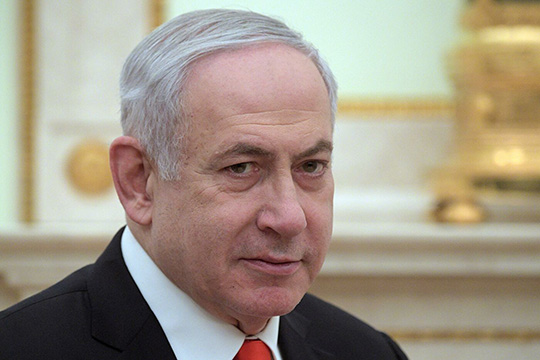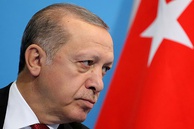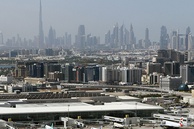Israel’s Prime Minister Benjamin Netanyahu has announced plans to establish as of July 1 Israeli sovereignty over the Jordan Valley and over some areas of Judaea and Samaria, also known as parts of the West Bank and the River Jordan, which fell under the control of Israel as a result of the 1967 Six-Day War. At present, about half a million Israelis reside in these areas. However, most countries, citing international law, consider Israeli settlements in the West Bank illegal on the grounds that they pose an obstacle to clinching peace with Palestinians.
The announcement of the Israeli leader had nothing sensational about it. Israel’s policy, aimed at de facto annexing Palestinian territories and at legal acts regarding Israeli communities in the West Bank, undergoes no substantial changes. But this time, the issue under consideration is the legitimization, the establishment of the legal status of these territories as Israeli.
Ideas of this kind are constantly circulating within the ranks of the country’s right-wing politicians. Moreover, being a staunch Zionism maximalist and after 15 years in power, in the course of which he frequently enjoyed a parliamentary majority, Benjamin Netanyahu could have easily secured this status. However, political caution and pragmatism held him back. That’s why the question is why these plans have acquired a clear-cut shape now, with even a date set for the start of the process.
There seem to be many reasons for this. Naturally, some are personal. At the peak of success, in connection with the transfer of the US Embassy to Jerusalem and Washington’s recognition of Israel’s sovereignty of the Golan Heights, and also, following a triumphant recovery from the long-running government crisis, Benjamin Netanyahu is set on strengthening his positions, on winning the support of a maximum number of Israelis, particularly in the light of recent events, after his case went to court.[1]
But the main reason is overall support of Israel from the Trump administration. Never before were relations between Washington and Jerusalem that close.
Undoubtedly, what triggered the process was the ambitious and difficult-to-implement draft agreement proposed by US President Donald Trump to secure peace between Israel and the Palestinians, which, in the opinion of the White House, guarantees a final settlement of the Israeli-Palestinian dispute and puts an end to the more than 70 – year conflict in the Middle East. [2] The 180-page document stipulates that Israel maintains its sovereignty over the territory of the Jordan Valley, Judea and Samaria. In addition, Washington insists that Jewish settlements on Palestinian lands should be recognized as territory of Israel. That is, all Jewish settlements will remain in their places, including 15 remote settlements which are in no way connected to territories that will be handed over to Israel.
It’s no secret that the draft was developed by Trump’s officials within the framework of consultations with Israelis. The document, presented by Trump on January 28, 2020, was dubbed “the deal of the century”. After the presentation, Israeli and American teams got down to work to make maps of West Bank areas which Israel could annex first under the plan. Although, the American and Israeli positions do not always coincide.
Yet, the coming on the scene of the “deal of the century” and the Netanyahu plan are no accident. Times are changing.
Firstly, after a months-long political crisis in Israel a coalition government has been formed which will be run by Likud leader Benjamin Netanyahu for 18 months, and the remaining 18 months after November 17, 2021 (if nothing extraordinary happens) until the next elections – by Kahol Lavan leader Benny Gantz. Thus, the political instability at home has been neutralized.
The coalition agreement which has been achieved in Israel hinges on a document signed by Netanyahu and Gantz on behalf of their parties Likud and Kahol Lavan. This document regulates division of power, the functioning of the new government, and a detailed procedure of decision-making with the right of veto. One important reservation is that expansion of Israeli sovereignty (or annexation) can be proclaimed by Netanyahu and his party without the consent of Gantz, and accordingly, his party. This is the only political area which has such a reservation which abolishes veto.
What speaks of Netanyahu’s “resoluteness” is a changed role of Israel in regional and global affairs. Having integrated into the global economy, Israel, without any exaggeration, has achieved a lot, both technologically, and in terms of security potential. This was backed by progress in the demographic sphere (which is important for Israel), and in the economy. In 2000 the population of Israel was a little over 6 million, in April 2020 - 9,2 million.[3] (At the time of the declaration of independence in 1948 Israel was home to 872 700). In 2000 per capita GDP totaled $ 21038, by 2020 it increased to $ 42823.[4]
The hefty reserves of natural gas which were discovered on Israel’s Mediterranean coast in 2010 and which are already being developed form a foundation of the country’s energy independence and enable it to become a gas exporting country. All this contributes to Netanyahu’s confidence.
Israel’s position in the Middle East is changing as well. The Arab neighbors have become less adverse to it. Gulf monarchies, along with other Arab nations are getting closer and closer to Israel in their confrontation with Iran. Europe, preoccupied with migrant-related problems, is less critical of Israel and less protective of Palestinians. Meanwhile, Palestinian political institutes, just like Palestinian leaders, are split between the West Bank and Gaza, which makes them weaker politically.
On the whole, the Palestinian issue appears to be tiring for many actors in the Middle East.
Therefore, a combination of positive factors, both subjective and objective, has set the stage for the appearance of Trump’s “deal of the century” and led to the present announcement of the Israeli prime minister.
US and Israeli leaders are in a hurry: November 3, 2020 – the day of the presidential elections in America – may become critical for the far-reaching plans of the parties concerned.
It needs to acknowledge, however, that if put into effect, the Netanyahu plan is fraught with severe consequences for Israel proper, and for the rest of the Middle East.
Undoubtedly, the initiative voiced by Prime Minister Netanyahu will prove explosive for the current political situation in the country, which is complicated enough without it. Protests are already rolling through Israel against the expansion of sovereignty to the West Bank. Even Netanyahu’s supporters are fully aware that the risks in the Netanyahu-proposed strategic game are extremely high. A great deal is put on stake: human lives, security, economy, the country’s international image. That is why voices against the plan are heard ever more frequently, demanding that the date of the start of the sovereignty declaration procedure be postponed.
Moreover, on June 9 the Israeli Supreme Court of Justice passed a ruling that could come crucial for the country and for the Israeli-Palestinian settlement process. The Court abolished a law under which Jewish settlements in the West Bank which were built on Palestinian territories illegally, can be legalized.
The Netanyahu plan boosts the risk of a new intifada, new terrorist attacks from radical Islamists. Naturally, Palestinians are highly adverse to the move. Deputy chief of the JAMAS “political bureau” Saleh Aruri has made it clear that a return of “armed confrontation” to the West Bank has become a possibility, “more probable than some could imagine”.
A political storm at home will have a negative effect on Israeli economy and will undermine its defense potential, its power to confront JAMAS, Hezbollah and their ally – the Islamic Republic of Iran. Tehran will get a good stimulus for activating anti-Israeli propaganda, for convincing its Arab neighbors of Israel’s wickedness, for expanding financial and military support of Palestinians in their struggle for a Palestinian state, for initiating a new phase of the hybrid war against the Jewish state.
The fledgling Israel-friendly architecture for the Middle East, which envisages a certain normalization of relations with Arab opponents, may crumble in a flicker of an eye.
Without doubt, Arabs will condemn the Netanyahu plan, though it may happen that Egypt, Saudi Arabia and some other Gulf states, having joined the anti-Israeli chorus, will not risk jeopardizing cooperation with it.
Europe, which is a major trade partner of Israel, is against the Netanyahu plan. Israel is closely integrated with European cooperation programs, including in education, scientific research and innovations, which yield considerable mutual benefits. All this may now be put under threat. The position of the European Union on annexation is clear and consistent: the EU «does not recognize any changes of the 1967 borders, unless they are acknowledged by Israelis and Palestinians». The EU urges Israel to refrain from annexation.
China and Russia will adhere to their present positions, based on the resolutions of the UN Security Council and international law. Moscow and Beijing, while defending their views, will strive to prevent a deterioration of bilateral relations with Israel.
The Russian position on the Netanyahu plan was spelled out by Russian Ambassador to Israel Anatoly Viktorov, who said that implementation of intentions to apply Israeli sovereignty to parts of the West Bank seemed a very dangerous scenario. Annexation of Palestinian territories by Israel will cross out prospects for a Palestinian-Israeli settlement and trigger a new upsurge of violence.
The ambassador reiterated a position in favor of a two-state solution on the basis of a commonly recognized international framework. He pointed out the need to secure an early resumption of direct talks between Israel and the Palestinians under the patronage of the United Nations in order to negotiate a final status and achieve a comprehensive peace settlement on the basis of UN resolutions and the Arab Peace Initiative.[5]
Earlier (on May 20) Russian Foreign Minister Sergei Lavrov, speaking on the phone with Israeli Foreign Minister Gabi Ashkenazi, confirmed Russia’s readiness in tandem with other members of the Middle East Quartet (Russia, the USA, the EU, the UN) to contribute to the reset of a peace process by means of a dialogue between Palestinians and Israelis. [6]
The Palestinian-Israeli problem is clearly a knotty issue which has been a point of unsuccessful talks for more than 70 years. It penetrates the political, diplomatic and military space of the Middle East, affecting the situation in different parts of the region. The putting into effect of the Netanyahu plan on expanding the Israeli sovereignty to the Jordan Valley and parts of Judea and Samaria, coupled with Trump’ “deal of the century”, will surely cause an explosive reaction worldwide, in Israel proper, and throughout the Middle East.
It looks like the only positive thing about Netanyahu’s and Trump’s controversial and dangerous plans is that these projects have yet again attracted the attention of the world community to the Palestinian problem, an acute issue of our day. But July 1 is just round the corner!
The opinion of the author may not coincide with the position of the Editorial
[1] Reference: On May 24 the first session of the Jerusalem District Court got under way to consider three cases which were filed against Prime Minister Benjamin Netanyahu. This is the first time in Israel’s history when an incumbent prime minister is officially accused of criminal wrongdoing.
The first inquiry against the prime minister was held in 1999-2000. Back then, the police sued him on five charges – bribery, an attempt to embezzle state property, fraud, abuse of office and attempts to impede the inquiry. However, all lawsuits were closed before reaching court for lack of evidence.
The year 2016 saw a new inquiry which was conducted within the framework of three separate cases known in the press as «Case 1000», «Case 2000» and «Case 4000». On the basis of these cases the Israeli Prosecutor-General Avichai Mandelblit issued official charges against Netanyahu on November 21st, 2019. On «Case 1000» and «Case 2000» the prime minister is charged with fraud and abuse of trust (Article 284 of the Criminal Code provides for a three-year imprisonment), on «Case 4000» he is charged with fraud, abuse of trust and bribery (Article 290 of the Criminal Code, up to 10 years in prison). On January 28, 2020 all cases were transferred to the Jerusalem District Court.
Benjamin Netanyahu denies all charges saying that all the cases against him have been fabricated for the purpose of removing right wingers from power.
[2] https://interaffairs.ru/news/show/25325
[3] https://jewish.ru/ru/news/articles/192779/
[5] https://regnum.ru/news/polit/2981683.html
[6] https://www.mid.ru/ru/foreign_policy/news/-/asset_publisher/UdAzvXr89FbD/content/id/4133913
read more in our Telegram-channel https://t.me/The_International_Affairs

 11:02 28.06.2020 •
11:02 28.06.2020 •



























